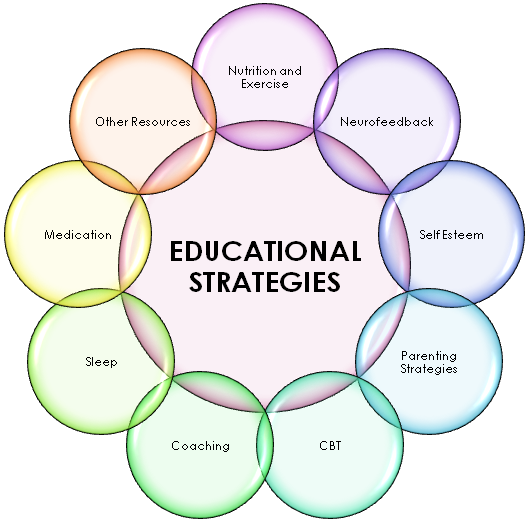Educational Strategies

A child with ADHD is easily distracted, will do things without thinking and is always on the go. They may have disruptive behaviour and they will also need extra help with learning.
Below are some guidelines to help a child with ADHD in the classroom. It is important that there is a good relationship between the teacher and parent of a child with ADHD. Let the parents know about any good changes in the child’s behaviour, as well as any bad changes. This could influence the strategies that the parents have in place for the child.
IEP, School Action and School Action Plus
You may feel that an Individual Education Plan (IEP) for a child struggling in the classroom may be appropriate. This should be discussed with the child and their parents to agree on the actions. Following an IEP, if the child does not improve, it may be appropriate to register the student for School Action.
This will involve discussion between the teacher and SENCO to devise appropriate learning materials and equipment. If the child still does not improve, the SENCO will register the child for School Action Plus and consult a specialist from external support services to help the child.
Tips For Inattentiveness And Distractability
- Sit the child at the front of the class to limit distractions, next to a student who will act as a role model, if possible
- Provide the child with visual instructions
- Break tasks down into manageable chunks
- Give the child short-term goals
- Increase the immediacy of rewards and consequences
- Use an incentive programme for appropriate behaviour
- Ask the child questions to keep their attention
Tips For Overactive Behaviour
- Provide the child with breaks to run errands or do specific tasks
- Provide short breaks between assignments
- Remind the child to check their work frequently as they rush to finish as quickly as possible
- Teach the child how to “slow down” with their work
- Use reward systems as much as possible
- Teach the child listening skills such as stopping work, putting down their pencil and looking at the teacher
Tips For Homework
- Use a home-school diary and keep parents informed on homework that needs to be completed
- Make sure the child hands in their homework and doesn’t leave it in their bag
- If the child often looses pieces of paper, email it to the parents
- If a child needs to write their homework in their diary, check that they do so
- Ensure you give the child a due date for homework completion
Tips For Difficulties With Peers
Unstructured times, such as playtime, are usually the most difficult times for a child with ADHD and it is often when they will do something impulsive with friends.
- Get them a play-mate
- Have visual reminders on how to make friends
- Social skills programmes
- Discuss with the child appropriate playtime behaviour
Medication In School
According to the Department for Education and Skills, day to day decisions about managing and administering medication is the head teachers responsibility. However, a teacher can volunteer to administer or supervise a child taking medication.
Taking medication at school is sensitive to many children. It is therefore important that this is dealt with in a sensitive manner. Many children with ADHD have difficulties with organisation, and therefore it is vital that a teacher reminds them to take their medication.
Some medications for ADHD are now long acting and therefore only need to be taken once a day, usually at home.
Useful Links:
- 100 Ideas for Supporting Pupils with ADHD, by Dr Geoff Kewley and Pauline Latham
- How to Teach and Manage Children with ADHD, by Fintan O’Regan



